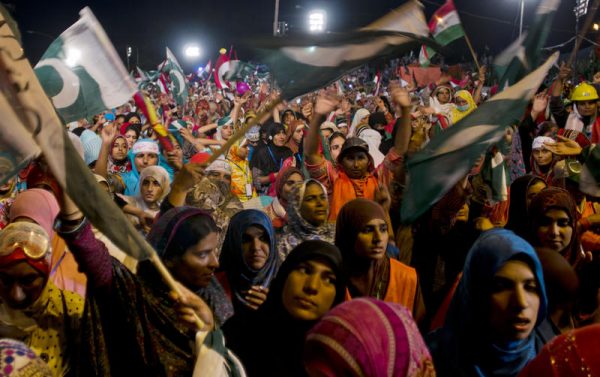Forcing a prime minister who commands an overwhelming majority in the house to quit sets a dangerous precedent in any democracy. Not one Pakistani prime minister since independence in 1947 has completed their set parliamentary term. The question is whether Nawaz Sharif’s departure could save the current dispensation or if this gridlock will lead to an extra-constitutional arrangement to get Pakistan back on track.
Khan and Qadri’s sit-ins represent a widely held belief that, under the present system, for the most part only people of questionable character make it into Pakistan’s parliament. They are seeking an overhaul of the system. But the beneficiaries vow to protect it.
Two further issues, separately championed by Khan and Qadri, have triggered the current standoff.
First, vote-rigging in the 2013 elections, now publicly admitted to by the senior-most officials of the election commission, led to Imran Khan’s call for an audit of four constituencies where the PTI lost. Instead, Imran offered an audit of four constituencies where PTI candidates won. Sharif’s stonewalling of this demand at multiple levels finally compelled Khan to up the ante. Khan claimed that unless Sharif resigned, entrenched interests in Pakistani politics could not be dislodged.
So why did Sharif not agree to the audit? Sharif’s party, the Pakistan Muslim League-Nawaz (PML-N), is built on patronage and power and not on ideology. The party now faces an internal meltdown and the loss of power in a repeat of its ouster in 1999. Revival of its fortunes in 2013, though questioned, was again built on its control over the Punjab through Sharif’s younger brother.
Second, Qadri’s sit-in was triggered by a callous attack on his Lahore offices by the Punjab Police killing 14 and injuring 90 on 14 June. For over two months the PAT’s attempt to get the case registered against the 23 accused — which includes the Sharif brothers and several of their henchmen — has been thwarted despite a court order. The judicial commission report on the incident has been kept secret, raising serious suspicions against the perpetrators.
Qadri seeks justice for the victims among other demands for the cleansing of the political system. Sharif resisted the filing of a police First Information Report (FIR) because he fears a similar fate to Pakistan’s most popular political leader and prime minister, Zulfikar Ali Bhutto. Bhutto was hanged by Sharif’s political patron General Muhammad Zia-ul-Haq when the FIR included Bhutto’s name in a murder case. This should haunt any politician in Pakistan.
The very nature of Pakistani politics — rooted in exclusivity — lies at the heart of the country’s troubles.
Paranoia resulting from two previous inglorious ousters, both related to power rather than principle, makes Sharif suspicious of all except his close family and friends. The cabinet rarely meets. Sycophancy prevails. Sharif attended the National Assembly only seven times in the first parliamentary year.
Instead of providing good governance, security of life and property and basic necessities, the Sharif brothers remain obsessed with launching high visibility road and bridge projects. Risky and expensive schemes of distributing free laptops only bring momentary respite and are no substitute for effective governance.
The power shortages that contributed to the downfall of the Asif Ali Zardari regime (who though president, controlled power as party head) are back with a vengeance after a temporary respite. Power rates have doubled in the 14 months since Sharif took over. Inflation is rampant. Not one power thief, tax evader or land grabber (key constituencies) has been arrested. This is also a source of the public anger articulated by PTI and PAT.
Broken commitments on releasing former general Pervez Musharraf and public condemnation of the former army chief by Sharif’s closest confidants has incensed the rank and file of the army.
Civilian governments since 2008 have sought to weaken the army’s role in critical areas of foreign policy and security. Where Zardari was a compromiser while in power, Sharif wants unbridled control over the army, causing fissures.
Though some say that the army is behind the current unrest, the generals do not seem intent on taking over a direct administrative role, leaving Sharif to stew in his self-inflicted mess. But, if the government remains dysfunctional, the military cannot indefinitely watch from the sidelines.
Those who now claim to defend democracy must understand that democracy is not just numbers — it is accountability, transparency, effectiveness and justice in governance, all of which are strikingly absent from Sharif’s agenda. Pakistan thus remains on the edge. If the system begins to care for the common people, Pakistan may yet turn a corner.
Sajjad Ashraf is Adjunct Professor at the Lee Kuan Yew School of Public Policy, National University of Singapore. He was a member of the Pakistan Foreign Service 1973–2004.

